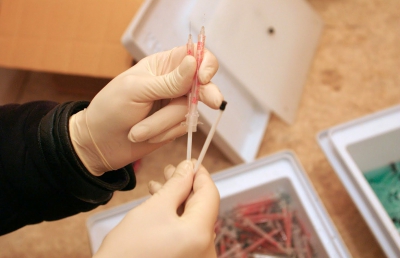In February 2015, Andries Swarts had a heart attack at 4:30 in the morning on the sidewalk of an inner-city street in Pretoria, South Africa. He calls it his “epiphany” moment. “Before that I had been really suicidal; I didn’t want to live anymore. I realised after the heart attack that it wasn’t that I didn’t want to live; it was just that I didn’t want to live that life anymore.” That life was a heroin addiction of 14 years, homelessness and a daily existence of fear, anxiety and depression.
Andries reached out to the peer educators of the Step Up project who used to come around regularly to offer mobile health services and a harm reduction programme to him and other drug users of inner city Pretoria. “I was so surprised when they treated with love, warmth and empathy. I was so used to being harassed, abused and judged by everyone I met. It gave me a spark of hope that pushed me through.”
Almost two years later, after a stint in rehab organized by Step Up, Andries is now a peer educator himself. He visits drug users on a weekly basis. “I build relationships with them and take an interest in them as people. No one can understand better than me what they are going through.” Using the mobile outreach van, Step Up offers HIV counselling and testing, initiation onto HIV treatment for users who test positive and adherence counselling. It also offers clean needles, equipment and water as part of the harm reduction programme and Hepatitis B and C testing. A handful of clients have been initiated on Opioid Substitute Therapy, but it is expensive and not widely available at this stage in South Africa.
“These guys don’t have access to services. They get turned away from the clinic; they get told ‘Go take a shower first.’ Listen, this guy is already beating himself up about how he smells, believe me, there is no need for you to tell him that. That’s why mobile services are essential.”
Andries says that adherence to antiretroviral therapy is higher than expected among the HIV-positive drug users he sees. “People immediately assume that they don’t want to live. That’s not true. They are just trapped in this life and can’t find a way out. So they adhere to their treatment.”
“I’m lucky that I’m HIV-negative. I shared so many needles with guys who I knew were HIV-positive. But at that time, before Step Up came along, I didn’t even know you could transmit HIV through sharing needles. I thought it was just sex.”
Andries does have Hepatitis C, but is managing it through living healthily. In South Africa, access to treatment for the disease is limited due to patent, registration and cost barriers. Andries believes this is an area which needs more advocacy; much like that of the HIV treatment activism decades ago in South Africa.
He also believes government needs to do more. “They should invest less money on arresting users and put that money into programmes and policies to get them off the streets,” he says.
